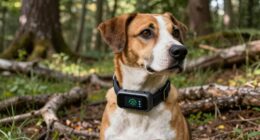In solo survival, your mental resilience is your strongest tool. To beat panic, focus on staying calm with slow breaths and positive self-talk, which keeps you grounded. Break tough choices into small steps, prioritize essentials, and concentrate on what you can control. Visualization and routines help maintain focus and calmness under pressure. Strengthening these mental hacks boosts your confidence and increases your chances of thriving—discover more strategies to stay composed when it matters most.
Key Takeaways
- Cultivate mental resilience through visualization, positive self-talk, and routines to stay calm under stress.
- Break decisions into small, manageable steps to prevent overwhelm and maintain focus.
- Use breathing techniques like slow, deliberate breaths to ground yourself during panic episodes.
- Concentrate on controllable factors, such as shelter or water, to foster a sense of agency and reduce helplessness.
- Practice mental hacks regularly to strengthen your ability to remain composed and make rational choices in emergencies.

Have you ever wondered what runs through your mind when you’re truly alone in a survival situation? When you’re isolated in the wild, your mental resilience becomes your strongest asset. It’s what keeps you grounded amidst chaos and helps you push through fear and uncertainty. Developing mental resilience isn’t about avoiding panic; it’s about learning how to manage it effectively. Your mind may race with urgent thoughts, but if you can stay calm and focused, you’re more likely to make smart decisions under stress. This ability to maintain clarity under pressure is essential, especially when every second counts. It’s about cultivating a mindset that embraces challenges rather than shies away from them, knowing that your attitude directly influences your actions and outcomes.
Your mental resilience is your strongest survival asset in the wild—stay calm, focused, and embrace challenges to make smarter decisions.
Decision making under stress in a survival scenario is a skill you can sharpen even before you find yourself in trouble. When panic starts to creep in, your instincts might urge you to act impulsively, but that can often worsen your situation. Instead, focus on grounding yourself. Take slow, deliberate breaths, and remind yourself that panic clouds judgment. Break down your choices into small, manageable steps. For example, if you’re lost, instead of trying to solve everything at once, prioritize finding water, then shelter, then navigation. This structured approach helps prevent overwhelm and keeps you in control. Remember, your mind is your most valuable tool—train it to stay resilient and make decisions based on logic rather than emotion. Incorporating mental hacks such as visualization and positive self-talk can significantly improve your ability to stay composed.
Practicing mental hacks before you head out can make a significant difference. Visualization techniques, where you imagine yourself handling different stressful scenarios calmly, can prepare your mind for real situations. Positive self-talk also plays a pivotal role; telling yourself that you’re capable and prepared reinforces confidence. Keeping your focus on what you can control, rather than what you can’t, helps maintain a sense of agency. Establishing routines and mental cues, like counting breaths or repeating calming mantras, can serve as anchors when everything around you feels chaotic. Over time, these practices strengthen your mental resilience, enabling you to stay composed and make smarter decisions under stress when it matters most.
Ultimately, your mental state can determine whether you survive or succumb to the pressures of the wild. Building resilience and mastering decision making under stress are essential skills that empower you to face adversity with confidence. The more you practice these mental hacks, the better equipped you’ll be to handle whatever challenges come your way. Remember, your mind is your greatest survival tool—train it well, and you’ll increase your chances of not just surviving, but thriving in the wild.
Frequently Asked Questions
How Does Sleep Deprivation Affect Mental Resilience During Solo Survival?
Sleep deprivation severely impacts your mental resilience during solo survival. It causes cognitive decline, making it harder to think clearly and make decisions. Your emotional stability also suffers, increasing the risk of panic and poor judgment. Without enough rest, your ability to stay calm and focused diminishes, which can be dangerous in survival situations. Prioritize rest whenever possible to maintain mental resilience and enhance your chances of staying safe and composed.
Can Mindfulness Techniques Be Effective in High-Stress Wilderness Situations?
Mindfulness meditation can be highly effective in high-stress wilderness situations. When you practice mindfulness, you focus on your breath and stay present, which helps reduce stress and calm panic. This mental hack enhances your resilience by lowering anxiety and improving clarity. By incorporating mindfulness techniques, you can better manage intense situations, stay focused, and make smarter decisions, ultimately increasing your chances of survival in the wild.
What Role Does Self-Talk Play in Managing Panic Alone in the Wild?
Did you know that self-talk effectiveness can boost your confidence in high-stress situations? When you’re alone in the wild, positive self-talk helps calm your mind and reduce panic. Using mental rehearsal, you prepare yourself mentally for potential challenges, making quick, rational decisions easier. Your internal dialogue strengthens resilience, helping you stay focused and composed. Essentially, self-talk plays a vital role in managing panic and maintaining mental clarity during solo survival.
Are There Specific Personality Traits That Enhance Solo Survival Mental Strategies?
You’ll find that certain personality traits boost your solo survival skills. If you have risk-taking tendencies, you’re more willing to face uncertainty and make quick decisions. Adaptability traits help you stay flexible and adjust to changing situations, reducing panic. These traits enhance your mental resilience, making you better equipped to handle stress and stay focused. Embracing these qualities can markedly improve your chances of survival when you’re alone in the wild.
How Can Prior Experiences Influence Mental Preparedness for Survival Scenarios?
Your past encounters shape how you respond in survival situations, boosting your mental preparedness. Reflecting on previous experiences helps you recognize patterns, stay calm, and adapt quickly. Skill development from those encounters builds confidence, making you more resilient when panic strikes. By learning from your past, you create mental shortcuts and strategies that keep you focused and composed, ensuring you’re better equipped to handle the stresses of solo survival.
Conclusion
Remember, staying calm boosts your chances of survival—studies show that a clear mind improves decision-making by 70%. When you’re alone in the wild, mastering mental hacks like focused breathing and positive self-talk can be game-changers. You’re more capable than you think; your mental resilience is your best tool. So, keep your mind sharp, stay composed, and trust in your ability to adapt. Your mental strength could make all the difference when it counts most.









